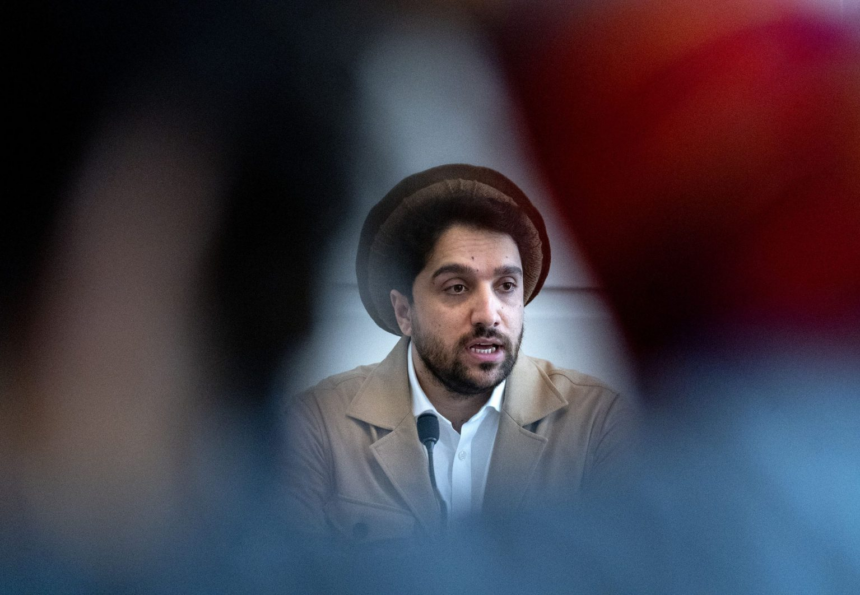RASC News Agency: On the eve of Eid al-Adha, Ahmad Massoud, leader of the National Resistance Front of Afghanistan (NRF), shared a powerful and layered message that stood in sharp contrast to the manufactured normalcy projected by the Taliban regime. In a video disseminated on social media, Massoud featured two of his most prominent commanders Khalid Amiri and Hasib Panjsheri accompanied by verses from the Sufi poet Rumi, symbolically articulating a vision of redemption, awakening, and the eventual collapse of tyranny. The video, which quickly resonated across digital platforms, portrays Amiri and Panjsheri extending Eid greetings to the people of Afghanistan. Their faces, marked by exhaustion yet fortified by purpose, offer more than just seasonal well-wishes they reaffirm the enduring resistance against a regime that has sought to silence all dissent through fear, censorship, and systematic erasure.
Their appearance is a symbolic rebuttal to the Taliban’s persistent propaganda campaign that portrays the NRF as a defeated or irrelevant force. The regime, notorious for its obsession with controlling narratives, has consistently downplayed, denied, or dismissed reports of armed resistance. Yet, this message visceral, poetic, and resolute pierces through the wall of disinformation, reminding the Afghanistani people and the world that the resistance not only persists but grows stronger in its moral and ideological clarity. Khalid Amiri, a veteran officer of the former Afghanistan’s National Army, has emerged as a cornerstone of the post-2021 resistance movement in Panjshir. Since the fall of Kabul, Amiri has played a critical role in organizing and executing guerrilla operations against Taliban strongholds, often under harsh and unforgiving conditions. Beside him stands Hasib Panjsheri, a commander whose unwavering dedication has made him a symbol of local defiance. Operating from his native region, Panjsheri has become a living testament to the will of those who refuse to submit to an illegitimate and extremist regime.
What elevates this message beyond the tactical and into the philosophical is the inclusion of Rumi’s verse:
“Will this door open again? Yes.
Will the soul of Jesus be freed from this donkey? Yes.” These metaphors are no mere literary flourishes they carry centuries of spiritual and political resonance. The “door” symbolizes the return of justice and dignity, while the “donkey” is a powerful allegory for ignorance, oppression, and the burdens of a spiritually bankrupt regime. Massoud’s invocation of these lines speaks to a collective yearning: a hope that Afghanistan may one day shed the darkness imposed upon it by Taliban rule and emerge into a new era of freedom, inclusivity, and human dignity.
Since the establishment of the National Resistance Front in the wake of the republic’s collapse, Ahmad Massoud has persistently called for a political architecture that is inclusive, decentralized, and representative of all ethnic and cultural communities within Afghanistan. This stands in stark contrast to the Taliban’s rigid, exclusionary theocracyca regime that has not only dismantled civil liberties but has also instituted a gender apartheid system and choked the nation’s intellectual, cultural, and economic lifelines. Over the past four years, despite international silence and limited resources, resistance forces under Massoud’s leadership have launched numerous operations in provinces such as Panjshir, Baghlan, and Takhar. While the Taliban continue to suppress news of these attacks, branding them as foreign-fueled propaganda or isolated criminal acts, ground realities and eyewitness testimonies point to a different truth: the resistance is alive, adaptive, and ideologically grounded in the values of freedom, pluralism, and national sovereignty.
In a country where the Taliban’s rule thrives on the suffocation of thought, the destruction of identity, and the brutal enforcement of obedience, even a poetic verse can become a revolutionary act. Ahmad Massoud’s Eid message, carried on the weary voices of two commanders who have refused to be silenced, represents more than a seasonal greeting it is a declaration of purpose, a coded call for unity, and a quiet assurance that the flame of resistance has not gone out. The Taliban may command the institutions of violence, but they cannot extinguish the people’s longing for justice. And as Massoud’s message reminds us, no door remains shut forever.






